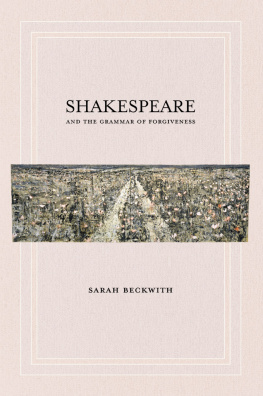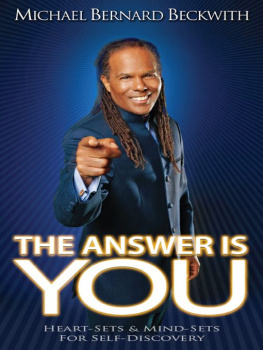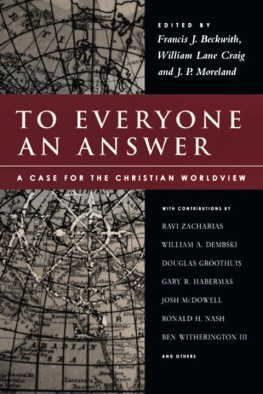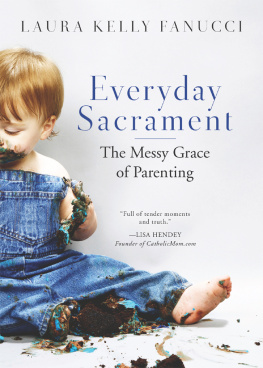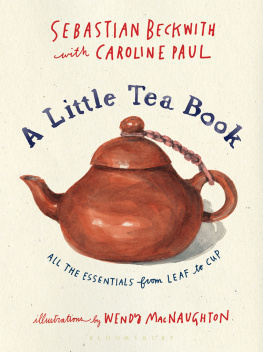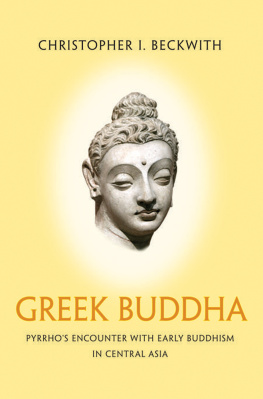
Abbreviations
The following abbreviations occur throughout the book.
| EETS | Early English Text Society. Oxford University Press. |
| LW | Luthers Works , ed. Harold J. Grimm. General editors, Jaroslav Pelikan and Helmut T. Lehman. 55 vols. Philadelphia: Muehlenberg and Fortress, and St. Louis: Concordia, 19551986. |
| MED | Middle English Dictionary, ed. Hans Kurath. Ann Arbor: University of Michigan Press, 19532001. |
| OED | The Oxford English Dictionary, 2nd ed. Oxford University Press, 1989, and updates. |
| ST | Summa Theologica. Complete English edition. 5 vols. Trans. and ed. the English Dominican Province. Notre Dame, IN: Ave Maria Press, 1984. |
Unless otherwise noted, all Shakespeare quotations are from The Riverside Shakespeare, 2nd ed., ed. G. Blakemore Evans. Boston: Houghton Mifflin, 1997.
In Middle English quotations the thorn has been modernized to th .
Acknowledgments
I would like to thank the actors and performers who have lent their bodies, souls, and minds to Shakespeares figures in the complex forms of the late romances I have seen while I was writing this book. Their readings and sense of accountability charted subtle and haunting paths into these rich and difficult plays. I thank my new friends and colleagues in theater studies whose dedication to theater is inspiring and humbling.
Richard Fleming in his magical seminar on Wittgensteins Philosophical Investigations, and Nancy Bauer, Tim Gould, and Sandra Laugier helped me to richer understandings of the work of J. L. Austin, Ludwig Wittgenstein, and Stanley Cavell, in their visits to the Ordinary Language Philosophy Working Group I convened at Duke with Toril Moi in 20072009.
An early version of chapter 3 appeared as Medieval Penance, Reformation Repentance and Measure for Measure in Reading the Medieval in Early Modern England, edited by Gordon McMullan and David Matthews (Cambridge: Cambridge University Press, 2007), 193204, and is reprinted with permission from Cambridge University Press. Chapter 6 appeared as Shakespeares Resurrections in Shakespeare and the Middle Ages, edited by Curtis Perry and John Watkins (Oxford: Oxford University Press, 2009), 4567, and is reprinted by kind permission of Oxford University Press.
I would like to thank David Aers, Toril Moi, Marianne Novy, Miri Rubin, Stanley Hauerwas, and two anonymous readers for their invaluable reading of the entire manuscript. Thanks also to Heather Hirschfeld, Jim Knowles, Julie Paulson, Beth Robertson, and James Simpson for reading sections of the manuscript, to Will Revere for indispensable help with the bibliography, and to Sarah McLaughlin for help at the copyediting stage. David Aers has read every chapter in progress and spent many hours in true generosity reading and sharing ideas with me over the years of our friendship, for which I am deeply grateful. Toril Moi has also been a constant companion in conversation as we evolved our books on Ibsen and Shakespeare whose work we love, and explored the extraordinary resources of Stanley Cavells astonishingly deep and suggestive writings. Stanley Cavells thinking is all-pervasive in this book, especially his work in The Claim of Reason, Must We Mean What We Say? and A Pitch of Philosophy. With his excellent ear and incredible generosity, he also whispered crucial words of encouragement along the way for which I cannot thank him enough.
Several friends and colleagues helped the work along by inviting me to participate in conferences, give talks, share Shakespeare, and test out my ideas in front of different audiences. Thanks to Larry Rhu at the University of South Carolina, Ralph Berry at Florida State University, Toril Moi at Duke, Chris Chism at Rutgers, James Simpson and Christina Wald at Harvard, Dale Martin at Yale, Ken Graham at the University of Waterloo, Jim Rhodes at Southern Connecticut State University, my hosts at the University of Chicago where I gave the Yves Simon lecture, Clare Lees and Gordon McMullan at Kings College London, Ryan McDermott and Elizabeth Fowler at the University of Virginia, Jennifer Wald and Mike Witmore at the University of Pittsburgh, Mike Witmore and Will West at Northwestern, and Lincoln Faller, Mike Schoenfeldt, Julia Hell, Cathy Sanok, and Karla Taylor at the University of Michigan in Ann Arbor.
My thanks also go to Danny Herwitz and my lively, fascinating colleagues at the Institute for the Humanities at the University of Michigan where I held the Nicholas Frehling fellowship in the spring of 2005. Thanks to Regina Schwartz, John Watkins, Heather Hirschfeld, and Elizabeth Fowler for providing the occasion for stimulating sessions at the Shakespeare Association of America and the Renaissance Society of America, where I tried out some thoughts in this book.
I also want to thank the chairs of the English department at Duke University, Maureen Quilligan and Ian Baucom, for support during the time I wrote this book, particularly Maureen, who has always taken the most (characteristically) generous and encouraging attitude to my Shakespearean explorations, even when she thought I might be doing better things with my time. Thanks also to deans William Chafe and George McLendon, who allowed me leave to draft and complete this book. I thank the wise and intuitive Peter Potter at Cornell University Press for helping this manuscript reach its audience, and to Kay Scheuer, Kate Mertes, and Candace Akins for their efficiency, kindness, and skillfulness.
I still hope that one day I will write a book that my family will enjoy reading. I may not have done so here, but I thank them all for their loving interest and for being the fascinating, strong people they are. To Simon and Val: I wish you more pleasure and joy as you finish the Shakespeare marathon, whenever that might be.
I dedicate this book in love and friendship to my amazing husband, Bart Ehrman. The Ehrman universe is a world of extraordinary focus and intensity, and quite alarming productivity. But in this world he still found the time to listen to my intuitions until they became thoughts, and then he read every page I wrote with his wonderful blend of precision and common sense. Though he has sworn off any more performances of Othello, I am grateful to him for his companionship at the many plays we have seen together. It is true that he has seen more Shakespeare than I have seen football games. This lack of reciprocity in our marriage is unlikely to be rectified. I offer to him the words of Montaigne to his friend La Botie: If you press me to tell why I love(d) him, I feel that it cannot be expressed, except by answering: Because it was he, because it was I.
Bibliography
Adams, Robert. Langlands Theology. In A Companion to Piers Plowman, ed. John A. Alford, 87116. Berkeley: University of California Press, 1988.
Adelman, Janet. Bed Tricks: On Marriage as the End of Comedy in Alls Well That Ends Well and Measure for Measure. In Shakespeares Personality, ed. Norman N. Holland, Sidney Homan, and Bernard J. Paris, 15174. Berkeley: University of California Press, 1989.
Aers, David. Salvation and Sin: Augustine, Langland, and Fourteenth-Century Theology. Notre Dame: University of Notre Dame Press, 2009.
. Sanctifying Signs: Making Christian Tradition in Late Medieval England. Notre Dame: University of Notre Dame Press, 2004.
Aers, David, and Sarah Beckwith. The Eucharist. In Cultural Reformations: Medieval and Renaissance in Literary History, Oxford Twenty-First Century Approaches to Literature, vol. 2, ed. Brian Cummings and James Simpson. Oxford: Oxford University Press, 2010.
Next page
